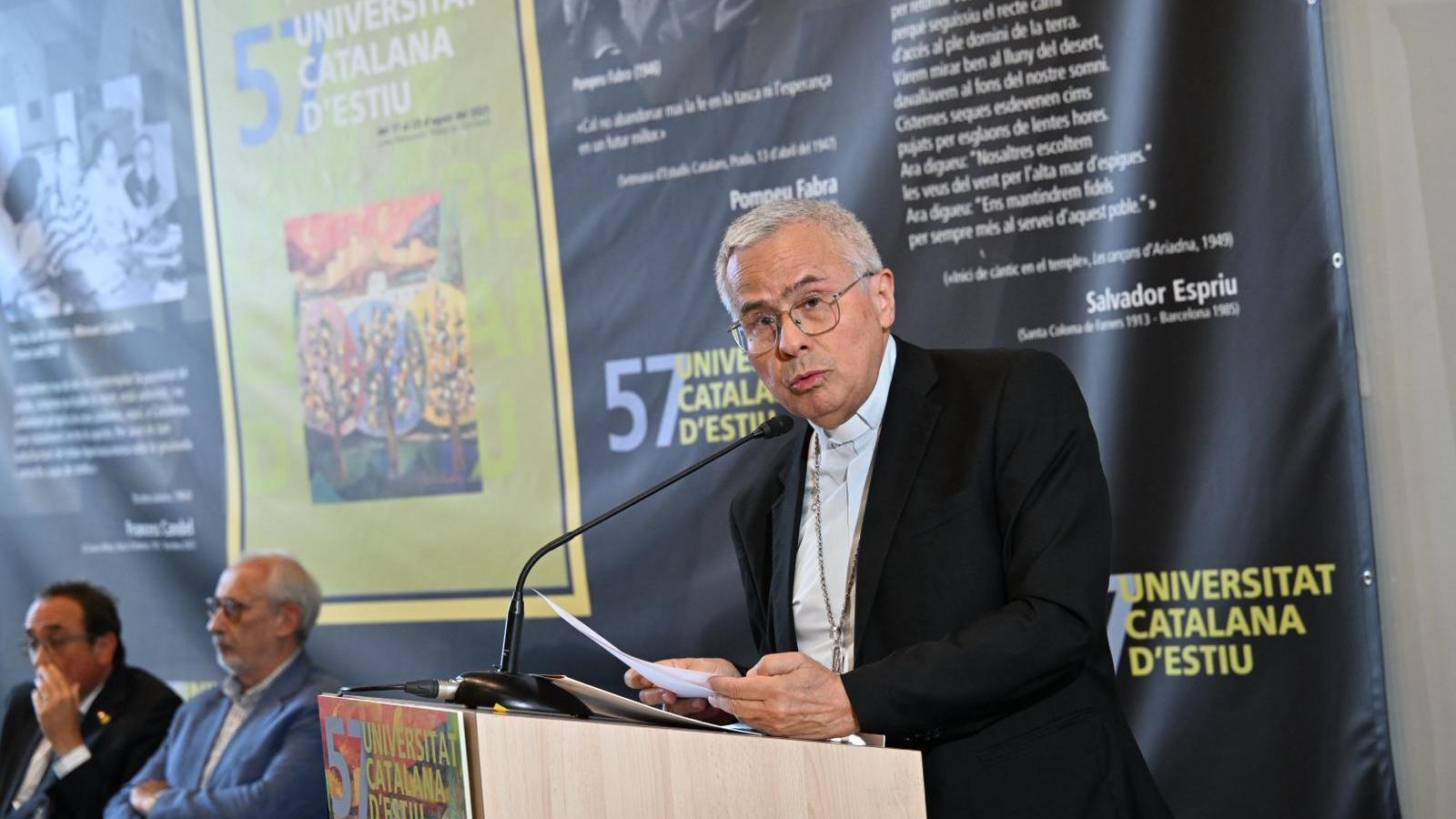The head of the Catalan bishops changes his position with the abbot and claims Montserrat as "the country's common home."
Manel Gasch says he takes note of the "homework" assigned to him by Catholic Catalanism during the presentation of the Canigó Prize at the abbey.


Conflent MeadowMontserrat Abbey received the Canigó Prize this Thursday, awarded by the Catalan Summer University (UCE) in recognition of its thousand-year history, inseparable from that of Catalonia. But both the award ceremony and the presentation of the prize, which was received by Father Abbot Manel Gasch, were marked by a profound change. due to the controversial participation of Felipe VI at the millennium celebration event, which unleashed an earthquake within Catalan Catholicism. During the ceremony, Gasch had to listen to several calls for Montserrat to continue being "the spiritual refuge," the "center of cultural resistance," and the "common home" of the Països Catalans. These were the words used by the Archbishop of Tarragona and president of the Tarragona Episcopal Conference, Joan Planellas, in his speech to the audience.
"The Monastery of Montserrat must not abandon its role, the work it has been carrying out in these first thousand years of existence, and especially in this last century," said the head of the highest Catalan episcopal institution. The words might sound like a mere reflection were it not for the fact that, aside from the controversial presence of the king at Montserrat, Gasch has spoken out in favor of of a certain withdrawal of political commitment of the abbey. This was expressed at a ceremony Vanguard Forums: "Montserrat must step back from the protective role it played in the 1960s and 1970s, a substitute role in a society that couldn't express itself democratically." This Thursday, Planellas specifically praised Abbot Escarré, an opponent of the Franco regime who was forced into exile and a staunch defender of Catalonia's national rights.
Rull acknowledges "discomfort"
However, the Archbishop of Tarragona made no mention of the royal visit. The Speaker of the Parliament, Josep Rull, did, and addressed the abbey's history and its historic role as a spiritual beacon for the nation. Speaking to the press, Rull acknowledged his "discomfort" at inviting the king to Montserrat, especially considering his October 3rd speech against the 1-O government, of which he was a member. He explained that he had communicated this to the abbot, whom he met at a morning mass at the Abbey of Sant Miquel de Cuixà—which belongs to the abbey's domain—although he declined to give details of the conversation. In his speech at the event, Rull also mentioned the "highs and lows" of the abbey during its thousand years. as he also did when Parliament awarded him the Gold Medal in the midst of a scandal over child sexual abuse within the institution.
The discomfort wasn't just Rull's. When Gasch took the stage, a couple of members of the audience held up signs reading "Catalonia has no king." The abbot's speech was short and much less politically charged than those of his predecessors, although he did emphasize the "Christian perseverance" that Montserrat has represented to Catalonia throughout ten centuries of history. However, the warnings from Rull and Planellas didn't go unnoticed. In fact, he wanted to make it clear that he wasn't familiar with any of the speeches before they were delivered: "First, I would say amen to some things. There's a good deal of homework, a good deal of material that invites reflection," he acknowledged. However, and also without explicitly mentioning it, he emphasized that every path taken by the abbey has always been the result of "God's will," of "the Rule of Saint Benedict," and of "listening to the voice" of those around them. The Benedictine rule of obligatory hospitality was, in fact, one of the arguments the abbey put forward when the controversy over the king's presence erupted.
Among the voices that rebelled against the king's invitation to the abbey was the Spiritual League of the Virgin of Montserrat, founded by Catholic Catalanists such as Bishop Josep Torras i Bages and Father Jacint Verdaguer. Its president, Joan Maluquer, one of the organizers of the UCE, followed their interventions from the front rows. The abbot made no statements outside the event, but in an informal conversation with the press, he denied any open war with Catholic Catalanism over the visit of Felipe VI. In fact, he also denied that anyone had expressed any discomfort to him about it.
The celebration of the millennium of the Montserrat Abbey will give way, in 2027, to the assemblies of Pau i Treva, signed in Toluges (Roussillon). Both share the figure of Abbot Oliba, of whom Rull, recalling the creation of the Catalan Parliament, said that he could be considered the father of the Catalan Parliament. "I'm not the speaker of a regional parliament. I'm the speaker of a nation's parliament. We have a thousand years of history on our shoulders," he emphasized. The association gave rise to one of the few relaxed moments of the event, when Gasch commented during the speech: "I didn't know we shared a founder. I found it funny!"
The Director General of the Generalitat in Perpignan, Albert Piñeira, also participated in the event on behalf of the Government. —former mayor of the PDeCAT and, later, of Junts—He championed Montserrat as a "center of spirituality" and a source of the values that define Catalonia as a "nation."
